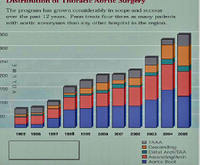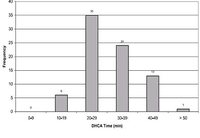"It was all those people in the cars coming the other way. It's just that they looked so lost," she says. Like they were all dead. Like a funeral procession."
Robert Pirsig. Zen and the Art of Motorcycle Maintenance.
I've been thinking a lot about quality lately. For two decades, I have accepted the industrial definitions of quality advanced by Deming and his disciples, and the evidence based outcomes-driven practice style that this model drives. I and my colleagues have written about limitations resulting from a slavish devotion to this model; the stifling of innovation being one and the reliance on weak data and the devaluation of individual experience being another. While my leadership responsibilities have kept me focused on measurable outcomes as a context acceptable to all stakeholders, I observe a frustrating flatness creeping into the medical enterprise and I have come to believe that it derives from what I now call "spread-sheet medicine," and its major driver, "quantitative quality." Quantitative quality is the narrowly focused equating of quality with clinical outcomes; morbidity/mortality and costs.
This quantitative fixation is a classical notion, best defined by the aphorism "If you can't measure it, it isn't real." Of course, that's nonsense; just ask any musicologist or art historian. Romantic tradition understands that there is non-quantitative Quality, and that it is vital to a meaningful life. Opposing the quantitative quality is this other view of Quality; the artistic or romantic view; let's call this "values quality"
I prefer to think of quantitative outcome assessment in medicine as "effectiveness" rather than Quality. It is an important component of medical quality but it is by no means the only consideration. This is not a trivial distinction. Like all discussions or disagreements, how you frame the debate defines the results. Management people say, "you can't manage what you don't measure..." They are highly motivated to limit the scope of quality to things they can "get their arms around," in order that they may discharge their fiduciary responsibilites to hospital owners and payers. The masters of industrialized health care; the money men, aren't interested in values-quality. As a US Senator once counseled me, "The marketplace won't pay for compassion." Nor in my experience, will they acknowledge the legitimacy of any intangible values; unless, of course, it's their turn in the bed.
 Clinicians, on the other hand, find the quantitative quality paradigm
to be artless; or as my 17 year old would say, "it's soul-sucking."
It's not that it's not important. It is. But, while being necessary, it
is not sufficient. Quantitative quality may drive systems of care, but
it will never inspire caring. And, as Pirsig points out, without caring there can be no true Quality. But our dislike of being managed; of being
part of the "machine," is not in itself sufficient justification for
seeking to modify the paradigm. We have to have a better reason than
that if we expect to persuade ourselves or anybody else that it's time for deep reconsideration.
Clinicians, on the other hand, find the quantitative quality paradigm
to be artless; or as my 17 year old would say, "it's soul-sucking."
It's not that it's not important. It is. But, while being necessary, it
is not sufficient. Quantitative quality may drive systems of care, but
it will never inspire caring. And, as Pirsig points out, without caring there can be no true Quality. But our dislike of being managed; of being
part of the "machine," is not in itself sufficient justification for
seeking to modify the paradigm. We have to have a better reason than
that if we expect to persuade ourselves or anybody else that it's time for deep reconsideration.
 Mitch Keamy is an anesthesiologist in Las Vegas Nevada
Mitch Keamy is an anesthesiologist in Las Vegas Nevada
 Andy Kofke is a Professor of Neuro-anesthesiology and Critical Care at the University of Pennslvania
Andy Kofke is a Professor of Neuro-anesthesiology and Critical Care at the University of Pennslvania
 Mike O'Connor is Professor of Anesthesiology and Critical Care at the University of Chicago
Mike O'Connor is Professor of Anesthesiology and Critical Care at the University of Chicago
 Rob Dean is a cardiac anesthesiologist in Grand Rapids Michigan, with extensive experience in O.R. administration.
Rob Dean is a cardiac anesthesiologist in Grand Rapids Michigan, with extensive experience in O.R. administration.









